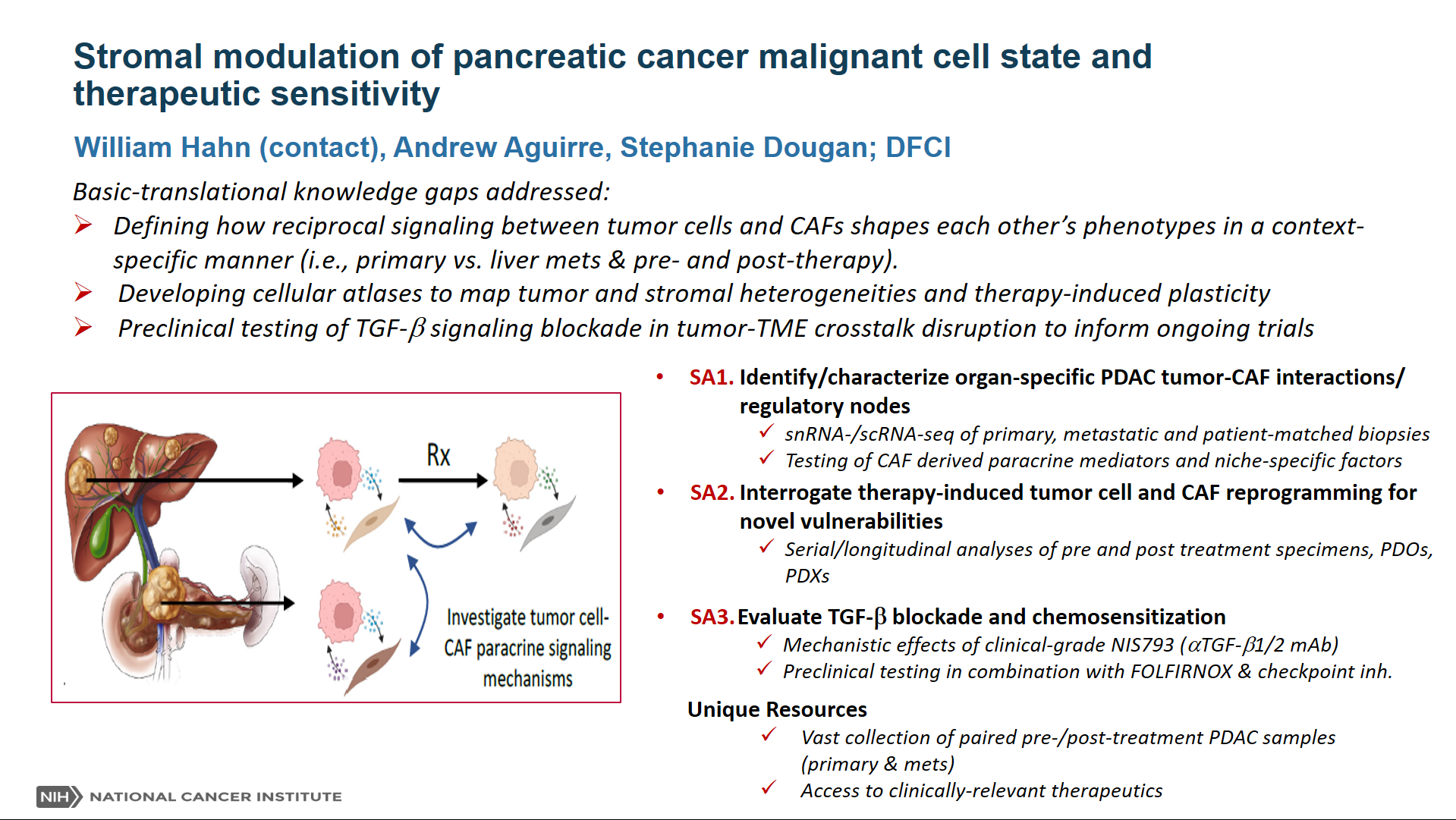Unlike many cancers, pancreatic ductal adenocarcinoma (PDAC) is characterized by a hypoxic, nutrient- deprived, immunosuppressive tumor microenvironment (TME) and a fibrotic stroma that may impair treatment response. Recent single-cell studies suggest a complex interplay between malignant tumor cells and other cell types within the TME, with crosstalk between tumor and stromal cell types influencing malignant cell phenotypes, including responses to therapy. Understanding these interactions will provide insight into PDAC progression and therapy resistance. In particular, cancer-associated fibroblasts (CAFs) are a major non-immune cell component of the TME and are comprised of several distinct subtypes that vary based on tumor subtype and the surrounding microenvironmental niche. In this proposal, we bring together a multidisciplinary team of basic and translational investigators that will build upon our prior studies to investigate the Tumor-TME co-organizer model with a focus on interrogating interactions between PDAC tumor cells and CAFs in the TME. Specifically, we will examine the overarching hypothesis that reciprocal signaling between tumor cells and CAFs shapes malignant cell and CAF phenotypes in a context-specific manner that can be modulated by prior therapy and the organ-specific niche. We will leverage multiple built-in capabilities, including genetically engineered mouse models (GEMMs), patient- derived organoid (PDO) and matched fibroblast models, functional genetic screens and clinical trials with serial biopsies to study the PDAC TME continuum in disease progression and resistance to therapy. Specifically, we propose (1) to determine whether targeting organ-specific PDAC-CAF interactions enhances therapeutic responses, (2) to interrogate novel vulnerabilities resulting from tumor cell and CAF reprogramming during PDAC therapy, and (3) investigate whether TGFB blockade disrupts tumor cell-CAF crosstalk and sensitizes PDAC to chemotherapy. In pursuing these studies, we will work with other members of the PDAC Stromal Reprogramming Consortium (PSRC) to pursue collaborative studies to understand how PDAC and TME interactions program tumor progression and therapy responses. For more information click here


William Hahn, MD, PhD is a medical oncologist and the Chief Operating Officer of Dana-Farber Cancer Institute, the William Rosenberg Professor of Medicine at Harvard Medical School, and an Institute Member of the Broad Institute. His lab utilizes functional genomic tools to improve our molecular understanding of cancer and to define cancer cell vulnerabilities and new therapeutic strategies.

Andrew Aguirre, MD, PhD, is a medical oncologist at Dana-Farber Cancer Institute, an Assistant Professor of Medicine at Harvard Medical School and an Associate Member at the Broad Institute of Harvard and MIT. Dr. Aguirre leads a basic and translational cancer research laboratory that studies pancreatic cancer biology and RAS signaling with the goal of developing new therapeutic strategies for patients.

Stephanie Dougan, PhD is an Associate Professor of Microbiology and Immunobiology at Harvard Medical School and a member of the the Department of Cancer Immunology and Virology at Dana-Farber Cancer Institute. Dr. Dougan leads basic and translational laboratory focused on enhancing the immune response to pancreatic cancer and seeks to develop new immunotherapies for patients.

Dr. Jonathan Nowak, MD, PhD is a molecular and gastrointestinal pathologist at Brigham and Women’s Hospital and the Dana-Farber Cancer Institute, and assistant professor of pathology at Harvard Medical School. He specializes in the molecular characterization of solid tumors, with a specific focus on pancreatic and colorectal cancer, and runs a joint laboratory with Dr. Brian Wolpin focused on tissue-based analysis of human pancreatic cancer specimens.

Dr. Brian Wolpin, MD, MPH is a medical oncologist, Director of the Gastrointestinal Cancer Center, Director of the Hale Family Center for Pancreatic Cancer Research and the Robert T. and Judith B. Hale Chair in Pancreatic Cancer at the Dana-Farber Cancer Institute. His research program is dedicated to the investigation of pancreatic ductal adenocarcinoma (PDAC) biology, early detection and therapy.